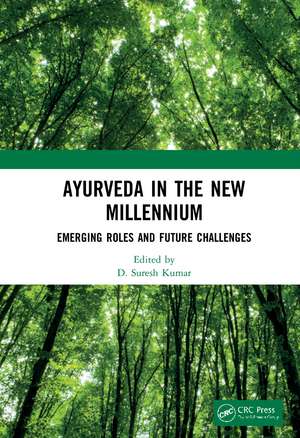Ayurveda in The New Millennium: Emerging Roles and Future Challenges
Editat de D. Suresh Kumaren Limba Engleză Hardback – 11 noi 2020
Features:
- Newer insights into the history of Ayurveda
- Regulatory aspects of the manufacture of ayurvedic medicines
- Industrial production of traditional ayurvedic medicines
- Quality control
- The scientific rationale of single herb therapy
- Biological effects of ayurvedic formulations
- Optimization of ancient wisdom and newer knowledge
- Conservation of threatened herbs
- Nutraceuticals and cosmeceuticals from Ayurveda
- Critical view of Ayurveda in the West
- Direction for the Ayurveda renaissance
Preț: 1117.70 lei
Preț vechi: 1363.06 lei
-18% Nou
Puncte Express: 1677
Preț estimativ în valută:
213.87€ • 223.76$ • 177.66£
213.87€ • 223.76$ • 177.66£
Carte tipărită la comandă
Livrare economică 02-16 aprilie
Preluare comenzi: 021 569.72.76
Specificații
ISBN-13: 9780367279547
ISBN-10: 0367279541
Pagini: 300
Ilustrații: 27 Tables, black and white; 56 Illustrations, black and white
Dimensiuni: 178 x 254 x 23 mm
Greutate: 0.66 kg
Ediția:1
Editura: CRC Press
Colecția CRC Press
ISBN-10: 0367279541
Pagini: 300
Ilustrații: 27 Tables, black and white; 56 Illustrations, black and white
Dimensiuni: 178 x 254 x 23 mm
Greutate: 0.66 kg
Ediția:1
Editura: CRC Press
Colecția CRC Press
Cuprins
Preface. About the Editor. Contributors. Chapter 1 What We Learn from the History of Ayurveda. Chapter 2 Manufacture of Ayurvedic Medicines – Regulatory Aspects. Chapter 3 Industrial Manufacture of Traditional Ayurvedic Medicines. Chapter 4 Quality Control of Ayurvedic Medicines. Chapter 5 Scientific Rationale for the Use of Single Herb Remedies in Ayurveda. Chapter 6 Biological Effects of Ayurvedic Formulations. Chapter 7 Evidence Building in Ayurveda: Generating the New and Optimizing the Old Could Be Strategic. Chapter 8 Conservation – A Strategy to Overcome Shortages of Ayurveda Herbs. Chapter 9 Lessons to Be Learnt from Ayurveda: Nutraceuticals and Cosmeceuticals from Ayurveda Herbs. Chapter 10 Ayurveda in the West. Chapter 11 Ayurveda Renaissance – Quo Vadis? Index.
Notă biografică
D. Suresh Kumar was born on September 21, 1949, in the southern Indian province of Kerala, where he received his early education. He obtained a BSc degree in zoology from the University of Kerala (1969) and secured MSc (1972) and PhD degrees (1977) from Banaras Hindu University, Varanasi. His doctoral thesis was on the hormonal control of oxidative metabolism in reptiles. Thereafter, he spent two years as a postdoctoral fellow in the Department of Biological Sciences, University of Aston in Birmingham, England, investigating the pancreatic physiology of the rainbow trout. He returned to India in 1980 and joined the Department of Zoology, University of Calicut, Kerala, as pool officer in the scientist pool of the Council of Scientific and Industrial Research, New Delhi. During his stay there, a chance encounter with some religious persons introduced him to the study of Ayurveda, the traditional medical system of India. He undertook a survey of the state of Ayurveda in the province and published his findings in provincial and national weeklies. In 1986, he joined the International Institute of Ayurveda, Coimbatore, as a research officer in the Department of Physiology. From 1986 to 2003, he carried out research on various aspects of Ayurveda. In collaboration with Dr. Y.S. Prabhakar, presently at CDRI Lucknow, he proposed the first mathematical model for the ayurvedic concept of tridōṣa in the disease state. He also offered a novel definition for the ayurvedic class of medicine arka, based on his study of the Sanskrit text Arkaprakāśa. In 2003, he joined Sami Labs Ltd., Bangalore, as senior scientist in the R&D laboratory. He spent several years in the company working on various aspects of new product development. From 2012 to 2016 he worked as head of R&D laboratory of the Ayurveda consortium, Confederation for Ayurveda Renaissance Keralam Ltd., Koratty, Kerala. In January, 2016 he joined Cymbio Pharma Pvt Ltd, Bangalore as Head (New product development) and since May, 2020 he works as Ayurveda consultant. He is the author of Herbal Bioactives and Food Fortification: Extraction and Formulation published by CRC Press (2016). E. mail: dvenu21@yahoo.com
Recenzii
"This book covers scientific aspects of Ayurvedic medicine from past to present and beyond. The material is dense, and each chapter begins with a table of contents for ease of reference. The author and contributors include a trove of past research and information making the case for the quality of this book. It is not merely a rehashing of previous work, but a connector between past work and what is possible in the future"
— Alane G Lucht, D.C., Northwestern Health Sciences University
— Alane G Lucht, D.C., Northwestern Health Sciences University
Descriere
Ayurveda in the New Millennium: Emerging Roles and Future Challenges attempts to survey the progress made in this field and to formulate a course of action to take Ayurveda to the new millennium. It also identifies the many stumbling blocks that need to be removed, if Ayurveda is to cater to the needs of a wider audience.
